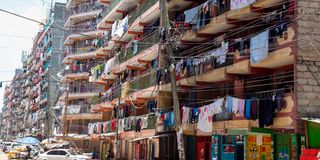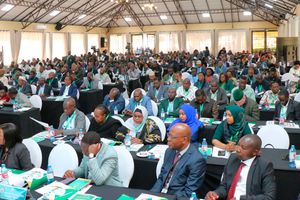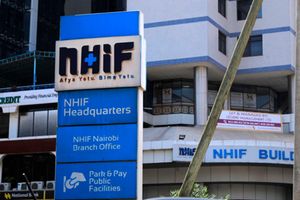
Residential flats in Nairobi’s Pipeline estate on March 16, 2025.
Shrinking pay for employees and job cuts have hit families hard as households’ purchasing power has declined, a parliamentary committee report has observed.
And households will plunge into further financial distress owing to harsh policies like the skewed methods being applied to determine what families pay for university education and a State-run medical scheme that has seen some unfairly slapped with higher rates.
Significant underfunding of the education sector, including capitation at all levels, the higher education funding model and uncertainty regarding the health coverage of learners previously under the National Health Insurance Fund (NHIF) are other challenges that will put pressure on families.
A proliferation of levies as well as runaway core inflation “which could occasion an increase in production costs for goods and services in healthcare and education” will worsen cost of living and doing business, according to a report by the Liaison Committee of the National Assembly on the 2025 Budget Policy Statement (BPS), which was adopted by the House last week.
Families are struggling to cope with shrinking incomes, with MPs citing data from the Kenya National Bureau of Statistics showing the purchasing power of households has declined over the 2020–2023 period “due to a consistent decline in real wages.”
The average real wages in the private sector decreased from Sh749,112 in 2020 to Sh686,451 in 2023 while those in the public sector dropped from Sh743,063 to Sh625,870 in the same period.
The report states that between 2019 and 2023, total employment increased from 18.1 million to 20 million people, indicating a rise in the number of employed individuals.
However, the report warns that there was a noticeable decline in the growth rate of employment, dropping from 4.9 per cent in 2019 to 4.4 per cent in 2023, largely attributable to the impact of government policies.
“The slowdown was more pronounced in the formal sector than in the informal sector. This is attributable to a slowdown in economic activity, technological changes and the impact of government policies,” the report says.
Formal employment in the private sector is majorly driven by manufacturing, agro-processing and wholesale and retail while in the public sector, education, public administration and defence play a crucial role.
“The committee emphasised that to alleviate unemployment in the country and create decent jobs for the young people, there is a need for targeted policy interventions to address the declining growth in formal employment, especially in sectors facing challenges,” the report states.
MPs flagged harsh government policies that will further deplete incomes like the skewed means testing instruments (MTI) that the government is applying to determine what households will pay for university education, and health and affordable housing deductions.
The reported indicates that the MTIs had seen some poor households slapped with high rates.
“The committee noted that the MTI intended to ascertain household contributions to SHIF (Social Health Insurance Fund) and classify students into funding bands for higher education, have faced challenges,” the report states.
It further reveals that issues like provision of inaccurate or incomplete information under the MTI hinder accurate determination of household contributions and proper banding of students for higher education loans.
“As a result, the delivery of social services has been adversely affected,” the report states.
Section 26 (5) of the Social Health Insurance Act that replaced NHIF, makes it mandatory for Kenyans and “a person who is a non-Kenyan and is ordinarily resident in Kenya” to register as SHIF members.
Those in formal employment within the public and private sectors part with 2.75 per cent of their salaries in monthly deductions for SHIF while those in informal employment will pay at least Sh500 in monthly instalments, determined through means testing.
According to the report, the resource requirements for various initiatives under the health sector reforms—SHIF, Primary Healthcare Fund and the Chronic, Critical and Emergency Illness Fund are not well defined.
“Failure to determine this at the planning stage implies the need for additional resources midway, which may further impact the fiscal deficit,” says the report.
The MPs also note that the significant delays in settlement of claims by the Social Health Authority (SHA) has adversely affected the operations of the health sector, “especially the primary healthcare facilities”.
The Affordable Housing Act provides for a housing levy at the rate of 1.5 per cent from the monthly gross salaries of those in formal employment, which is matched by employers.
The amount is then paid into a fund to be managed by the Affordable Housing Fund Board.
Currently, an employer who defaults in remitting the amount is liable to payment of a penalty equivalent to 2 per cent of the unpaid funds for every month if the same remains unpaid.
While the Act seems to expand the imposition of the levy to include the non-salaried Kenyans as decreed by the High Court, it does not explain how the government will collect the same from those in informal employment or running businesses.
The 2025 BPS has outlined various reforms and interventions in the education sector. However, the committee said that the fiscal analysis of the same reveals significant underfunding in the sector.
“Critical areas lacking adequate funding include capitation at all levels, the higher education funding model, teacher recruitment and promotion and infrastructure development”.
There is also concern over the growing proliferation of earmarked public funds accompanied by Appropriation in Aid increases in levies, fees and other charges, which have a significant impact on the cost of doing business and attractiveness of Kenya as an investment destination.
MPs are also concerned that access to cheap credit is increasingly becoming difficult. The Central Bank of Kenya revised its lending rate from a peak of 13 per cent in July 2024 to 10.75 per cent in February. However, the MPs’ report indicates that despite the decline in interest rates, credit to the private sector has largely contracted.
“The growth in credit significantly declined from 14.4 per cent in November 2023 to 4.6 per cent in November 2024,” states the report.
The decline was due to the deceleration of credit to the private sector from 13.2 per cent to negative 1.1 per cent.
This comes even as the government plans to increase its borrowing from the local market to Sh684.2 billion to partly finance the Sh831 billion deficit in the projected Sh4.3 trillion budget for the 2024/25 financial year.
The reduction in foreign borrowing, which will be matched by a Sh271 billion increase in domestic borrowing in the 2025/26 financial year, poses the risk of crowding out cheap credit to the private sector and may be “exacerbated by a larger-than-projected fiscal deficit”.
The government projects to borrow Sh146.8 billion from the external market, which is Sh208.7 billion below the projection for the current financial year, reflecting a reduction in receipts from the International Monetary Fund programme.
Given the possibility of revenue underperformance and additional expenditures, the committee warns that the actual deficit may be higher than the Sh831 billion projected in the 2025/26 budget, plunging the country into a “serious” budget funding crisis.








